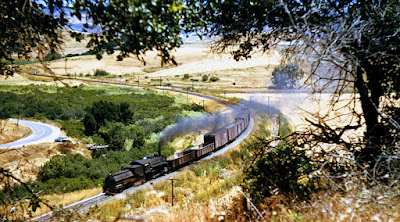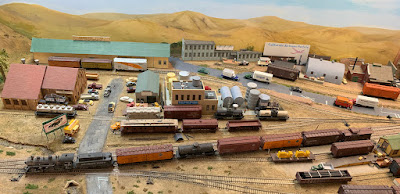This post constitutes a handout for a talk on operation of my layout. I have come to prefer a handout in this form because it can easily be updated or corrected, even in real time, and can contain live links to a variety of on-line resources, neither of which is true of paper handouts. In addition, it can readily include color graphics and other resources that get complicated to reproduce on paper.
This particular talk is about my layout goals, both the prototype aspects and the modeling goals. It also includes a segment on the waybills I use, as a route to more realistic operation. This means finding out about freight traffic on the prototype. I have benefited by the information in an SP conductor’s time book, as shown here:
http://modelingthesp.blogspot.com/2011/02/modeling-freight-traffic-coast-line.html
My layout design and goals are derived from the SP prototype. Below is one example (Dallas Gilbertson photo, Tom Dill collection) of the kind of operation I want to model. It shows the Guadalupe Local, at Hadley as it departs San Luis Obispo, with Consolidation 2752 operating tender-first. The crew had to choose which direction they would operate in this configuration, as there were no turning facilities at Guadalupe.
For background on my layout locale and modeling approaches, for the Southern Pacific Coast Division in 1953, I would recommend these two posts:
https://modelingthesp.blogspot.com/2019/08/conveying-ones-layout-locale.html
https://modelingthesp.blogspot.com/2012/04/coast-line-operations-1953-for-my.html
For more on waybills, there are numerous sources, including an article in Model Railroad Hobbyist. Below are a couple of links, the first to the MRH article description, but these extend far beyond these two write-ups. Sub-topics within the subject of waybills can readily be found by using the search box at top right of all posts, and selecting a search term for the specific interest that you have.
https://modelingthesp.blogspot.com/2017/12/my-new-column-in-model-railroad-hobbyist.html
https://modelingthesp.blogspot.com/2014/09/waybills-part-34-one-piece-waybill.html
Below is a summary, showing all the information contained in my model waybills. This closely mirrors the prototype waybill.
When all these elements come together — the prototype-oriented layout design, the trains and the freight cars, and the waybills that make it all function — can enjoy something like the photo below, a Santa Rosalia Branch local, having finished its work on the branch and returning westward with the cars it picked up, heading to Shumala.This talk has been interesting to prepare, as it brings together several threads of topics long discussed, but usually only separately. It has been a pleasure to look at all of them at once, and bring them together into a presentation.
Tony Thompson



Do you have any posts on tender-first operations? Your layout has been the only one I've seen that has this built-in as a feature. Is there any special requirements for a locomotive to be eligible for a run on a branchline with no turning facilities?
ReplyDeleteNo I haven't done such a post. No special requirements that I can think of.
DeleteTony Thompson